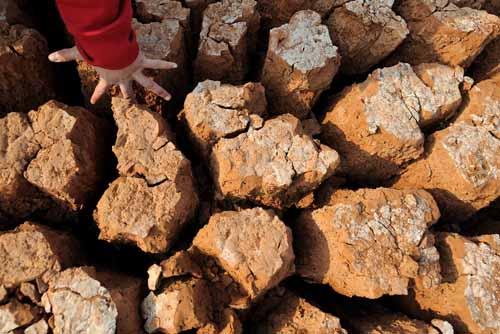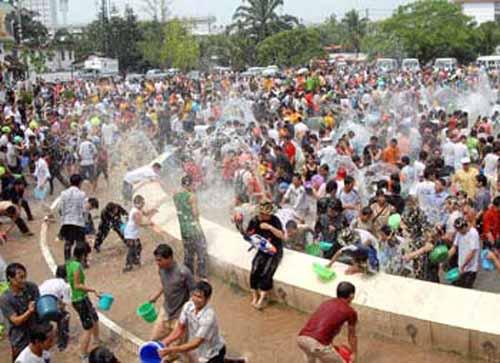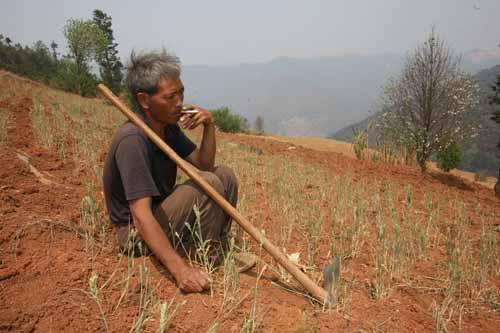 |
| A woman touches the base of a dry reservoir in the drought-hit Yi Autonomous County of Shilin, southwest China's Yunnan Province, March 25, 2010. (Xinhua/Lin Yiguang) |
JINGHONG, Yunnan, March 27 (Xinhua) -- A governmental decision to go ahead with the sprinkling spree to celebrate a traditional festival has sparked controversy as a prolonged severe drought in southwest China has left tens of millions of people thirsty for water and crops withered.
Netizens posted their harsh criticism after Duan Jinhua, head of the information office in Xishuangbanna Dai Autonomous Prefecture, Yunnan Province, confirmed in his microblog a week ago that celebrations for the New Year in the ethnic Dai calendar, featuring the sprinkling spree, will not be canceled despite the drought that is ravaging most parts of the province.
An online survey on the leading Internet portal Sina.com, showed that 52.3 percent of respondents backed the celebrations while 40 percent regarded it a waste of water.
However, the government of the Dehong Dai and Jingpo Autonomous Prefecture has decided to cancel official celebrations for the Water Sprinkling Festival, and leave local people free for their own choices.
The Water Sprinkling Festival, which is also observed by several other ethnic groups in addition to Dai in Yunnan, falls on April 15 this year. The traditional festival was listed a state intangible heritage in 2006 and has become a chance for carnival.
Actually, the official celebration in Xishuangbanna would be cut to two hours, three hours shorter than in previous years, and people are encouraged to splash less water, according to Duan.
But the cut did not satisfy critics as the worst drought in a century has increasingly become a major national concern.
 |
| Locals and tourists sprinkle water at each other during the annual Songkran, known as the Water-Splashing Festival in Xishuangbanna, southwest China's Yunnan Province, April 15, 2007. (newsphoto) |
"Look at the huge cracks on the land and withered crops," a netizen self-called Xishuang Xingzhe, or Faquir in Xishuangbannan, said at a forum of www. news.cn. "The drought is so severe, but they will still sprinkle water that is now as precious as life. It is a bit too brutal and the celebration is too big a luxury."
"On one hand water is as precious as oil, but on the other, water is regarded as nothing. Maybe such a sharp contrast could only arouse people's alertness in such a disaster year," a netizen called Huiwen said in a post.
The drought has lingered in southwest China for months, affecting 61.3 million residents and 5 million hectares of crops in Guizhou, Yunnan, Sichuan, Chongqing, and Guangxi, the Ministry of Civil Affairs said Wednesday.
The dry weather has also left 18 million residents and 11.7 million head of livestock in thirsty for water and caused direct economic losses of 23.7 billion yuan (3.5 billion U.S. dollars).
In the hardest-hit Yunnan province, direct agricultural economic losses are estimated at 17 billion yuan.
The drought has forced many villagers to sell their cattle for very low prices and left their cropland infertile.
Dry weather has affected over 80 percent of all planting areas in Yunnan, a region producing fresh flowers, rapeseed, sugar cane, tobacco and tea.
Many people in remote mountainous areas even have to walk kilometers to fetch water. In addition, 8.2 million people in Yunnan are short of food.
Some meterological experts said the drought is likely to continue to worsen till May when the rainy season starts.
 |
| A local farmer looks at dying crop in the field in Shihuitang village of Shiping County, southwest China's Yunnan Province, March 24, 2010. The sustaining severe drought ravaged this region since last October and made no harvest of crops. (Xinhua/Hu Yanhui) |
The drought, however, would never dry up ethnic Dai's passion for their most important traditional festival.
"Water sprinkling is an indispensable part of our new year celebrations," said 60-year-old Yannuo in Menghan township in the less-affected tropical prefecture. "We should not lose our tradition."
"Those who oppose the celebrations are neither Dai people, nor from an ethnic group that observes the tradition. I don't think they understand how important the festival is to us," said Wang Jinhan, a Dai girl in Manzha village.
The governmental decision has also gained understanding.
There is no reason to deprive Dai people's rights to celebrate their most important festival as the Water Sprinkling Festival, which has had a history of about 1,000 years, is as important to them as the Spring Festival is to the Han people, said a netizen self-dubbed NMGV.
An online supporter self-named Liyimen96 called on the critics to respect the ethnic culture and traditions, saying the traditional spree should not be canceled only due to the drought.
Zheng Peng, a Dai folklore expert, suggest people splash water in a symbolic way. "And actually the traditional way was also a kind of symbolic sprinkling. In tradition, people just dip tree branches into water and sprinkle it onto others," he said.
"I think the celebration can help unite the ethnic minorities and serve as a way of praying for rain and encouraging people to combat the drought," said Zheng, a member of the National Committee of the Chinese People's Political Consultative Conference, the country top political advisory body.
Related News
Photos
More>>trade
market
finance
- Aviagen's China Poultry School Continues to Grow
- MOA to Launch Nationwide Campaign on Specialized Control and Prevention of Pests
- Efforts to Be Made on Quality Tracing of State Farm Products
- Minister Han Meets with Canadian Minister of Agriculture and Agri-Food
- China: IGreen see a rising demand for greenhouses





